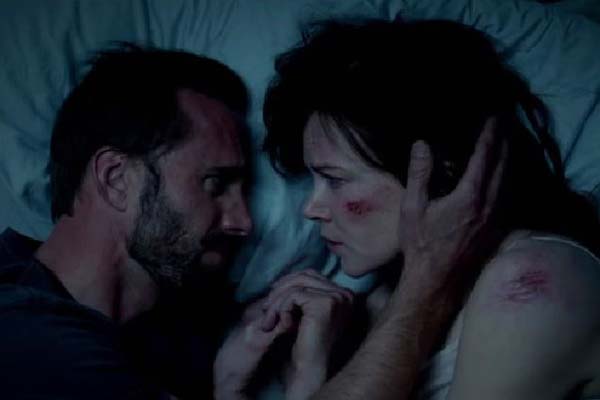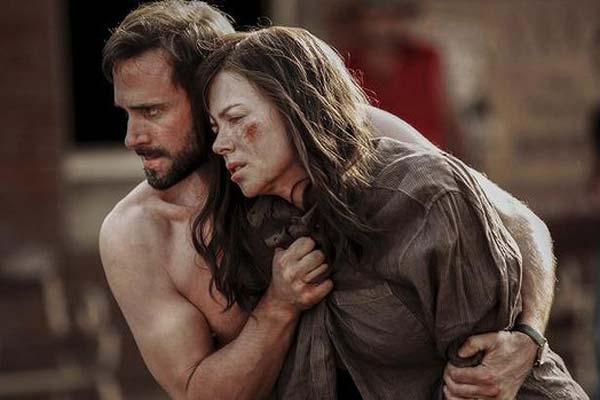Kim Farrant’s debut feature film, ‘Strangerland’, is like a sucker-punch to the sensitive spot where all your darkest emotions are stored; or, a confusing excursion that hints at places you’d like to go but then refuses to take you there.
Either way, it is not a first date film. Unless you’re into getting weirdly emotional with people you don’t know very well. In which case, a bottle of wine and a game of truth or dare is probably a safer bet.
Because, while 'Strangerland' will resonate powerfully with some viewers, it will severely underwhelm others. If you were to glance around at key moments in the film, you would see some people quietly weeping while others furrowed their brows in frustration. Which group you fall into depends greatly on your past experiences and the way you deal with things emotionally.
Set in a fictional outback Australian town, 'Strangerland' insinuates itself into the lives of the Parkers; a seemingly idyllic, nuclear family who, in reality, are struggling to hold themselves and each other together. We arrive in their world just in time to see them supernova. Their children lost in the desert – or somewhere worse – the Parkers face a struggle against the elements, their own demons and the prying eyes of others as they try to bring their fractured family back together.

The theme of missing children has been explored in cinema before in varied formats from the haunting old Aussie film, ‘Picnic At Hanging Rock’ to the more recent ‘Taken’ franchise. But none have approached the topic in quite the way Kim has with 'Strangerland'.
There's a tendency in society for people to hide what they fear might not be acceptable and, whether intentionally or not, to force others to do the same. In 'Strangerland', Kim systematically strips away her characters’ hiding places, forcing them to confront themselves, each other and their secrets, out in the open regardless of who might be watching.
The lead characters are given life by Nicole Kidman, Hugo Weaving and Joseph Fiennes. But Kim refuses to allow the big names, brilliant though they are, to overshadow the talent of the rest of her cast. “I was very lucky. But I'm also very lucky to have Meyne Wyatt and Lisa Flanagan who had supporting roles in the film and are some of the most sublime actors this country has. It was an absolute privilege to direct them.”
With casting, and with every other aspect of production, Kim strove for supremacy. She spent 13 years perfecting the film, infusing it with the ability to blithely slither in beneath all the social acceptable camouflage we carefully layer over our ugliest secrets. “I think audiences are getting more and more intelligent, they don't want to be spoon-fed. Maybe some do. But the majority of people don't. They want to be tested intellectually and emotionally.
“My experience is that, as much as people want to be entertained, they also want to be challenged. Sometimes there can be resistance to that within us. It can be confronting to see yourself reflected on a movie screen in the characters. But there's something in seeing the more shadowy aspects of ourselves that's very appealing.
“My intention was to explore what happens to us in times of crisis; the behaviours we go into when we’re really up against it, when we feel like we can no longer put a mask over our internal feelings, needs, desires, fears, all those things we normally deem inappropriate, unlovable, unacceptable. When we can no longer hold them down, our tragic flaws erupt and we act out in ways which can be easily and harshly judged.”
While Kim’s characters go through a whole spectrum of taboo behaviours from violence to alcoholism and workaholism, there is one theme that flows stronger than all the rest. “I was most fascinated with how people act out sexually in times of grief and loss because it’s something that goes on behind closed doors and it’s perhaps the thing that creates the most shame. My hope is, if we can illuminate some truth in this, then we can normalise that need for connection, that need for touch, and foster some compassion and self-forgiveness in people.”
And Kim has already had some powerful first-hand evidence that her intentions are reaching people. She loves attending viewings and getting a sense of how audiences are responding. It gives her the chance to listen to their reactions during the film and then talk with them afterwards and find out how it affected them individually. “I didn't work on it for 13 years to have people just watch it by themselves and not be a part of their experience. I wanted to go on the journey with them and see and feel their responses.
“I had a beautiful experience at Sundance where a 75-year-old woman came up to me. She waited for everyone else to go and she said: 'when I was 32, my husband died and I did so many of the things your character did and I've been so ashamed my whole life. I've never been able to talk about it.' She was 75 years old and I was the first person she’d told about it. She had carried that secret for over 40 years. For me, as a filmmaker, that was one of the most rewarding responses I've had because it helped heal someone. Helped bring some light into her life. Some relief. I feel like films are definitely there for entertainment but we also have an opportunity as artists, and an obligation, to offer new ways of thinking but also healing.”
While festival audiences have been swept up by 'Strangerland’s emotional undertow, some of the early critical reviews have expressed frustration at not being able to neatly fit the film into a genre. And it is true, 'Strangerland' is a bit of a genre-whore. It hints at potential supernatural undertones, takes some steps down the path of a police procedural, intones notes of a mystery. The possible paths are many, but each one is closed down without being fully explored.
Perhaps, though, this is entirely the point. Each of the unfulfilled genres also represents a way in which the Parkers might find their lost children. As each one is denied, their hopes are just that little bit more destroyed. The frustration you feel as a viewer is a tiny, flickering ember of the immense frustration felt by every parent who’s had a child go missing.
The emotions and behaviours expressed by the characters, while relatable, are not entirely universal and so, like any piece of art, there will be those who simply do not relate. But, whatever your personal reaction, Kim has created a film with a solid intention; one that, for the right kind of person, shines through to the deepest parts of their soul. “I'm proud of the film, it's beautifully shot and the performances are amazing. Of course there's things I'd do differently but that's the same with everything in life.
“After seeing the film, I hope people are inspired to communicate more of themselves, more of the demons inside of them, communicate their vulnerabilities, show all the different parts so others can see them. Ironically, when you see those vulnerabilities in another person, you usually fall in love with them more. When someone shows you the parts they think you could never possibly love, actually, greater intimacy, greater honesty and greater love grows.”

